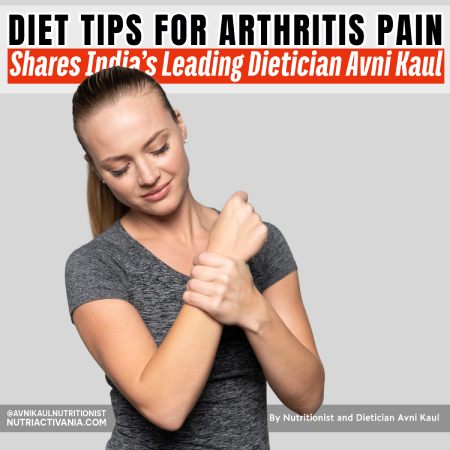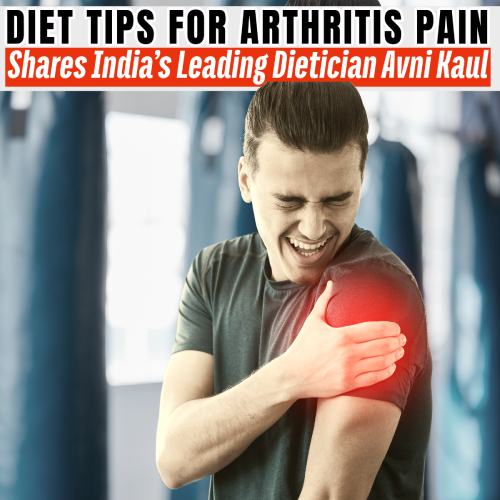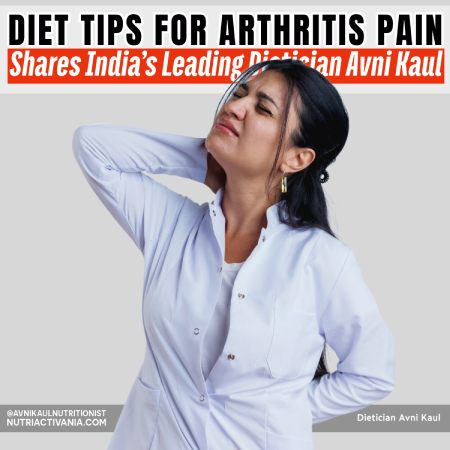Shares India’s Leading Dietician Avni Kaul
Arthritis is an inflammation of one or more joints, causing pain, stiffness, and reduced mobility. It makes daily life harder, as it can limit the range of motion and cause difficulty in performing simple tasks of bending or lifting things. Diet plays a crucial role in managing arthritis because certain foods can either promote inflammation or help reduce it. While there isn’t a one-size-fits-all diet for arthritis, there are certain foods that should be avoided due to their potential to exacerbate inflammation and discomfort. Avni Kaul, a prominent Dietician, warns us against a few food items.
What foods do you need to stay away from to arthritis pain at check?
Here are some foods that you need to stay away from that will help you prevent arthritis pain. Some of them are:
Fatty Foods: Certain fats promote inflammation in the body. Omega-6 fatty acids are found in oils like corn, safflower, sunflower, and vegetables; they’re fine in moderation. Saturated fat, present in meat, butter, and cheese, should be limited to under 10% of daily calories. Harmful trans fats lower good cholesterol, raise bad cholesterol, and heighten inflammation, as seen in processed, fried, and fast foods.
Sugary foods: Excessive sugar intake promotes inflammation, with just 40 grams (equivalent to a soda can) triggering this response. Eliminating sugary drinks, pastries, and candies could alleviate arthritis discomfort. Refined sugar in treats, chocolates, soda, and juices also induces cytokine release, contributing to inflammation. Beware of ingredients like corn syrup, sucrose, fructose, and maltose. While sugar substitutes like aspartame and sucralose are chosen to avoid sugars, they can still provoke inflammation in sensitive individuals. These substitutes appear in diet sodas, sugar-free candy, yogurt, and gum.
Refined Carbohydrates: Refined carbs, or refined grains, lead to blood sugar spikes and heightened inflammation. Hence, foods like white bread, pasta, and crackers should be avoided. Gluten-sensitive individuals might experience joint pain and inflammation with wheat consumption. While carbs fuel athletes, refined carbs in high-glycemic items trigger inflammation, weight gain, and chronic issues when unused.
Advanced Glycosylation End-products: Also called AGEs, these are toxins that are formed when food is heated, pasteurized, grilled or fried. It causes inflammation and protein damage. Avoid pan-fried or grilled steak, roasted or fried chicken, broiled hot dogs, fries, margarine, and mayonnaise among others.
Nightshades: Some individuals with arthritis find that certain nightshade vegetables like tomatoes, peppers, and eggplants worsen their symptoms. These vegetables contain a compound called solanine, which may contribute to inflammation in susceptible individuals. Keep track of your diet and symptoms to determine if nightshades are a concern for you.
Processed meat: Consuming significant amounts of processed and red meats, as well as dairy products, can potentially exacerbate the symptoms of rheumatoid arthritis (RA). Studies suggest that diets rich in these kinds of foods might contribute to the deterioration of RA symptoms. Moreover, certain research findings have indicated a potential connection between the consumption of red meat and the early onset of RA. You may opt for plant-based diets that may help reduce the severity of arthritis symptoms.
Tobacco and Hard Drinks: Say No to tobacco and hard drinks as smoking raises the likelihood of developing rheumatoid arthritis, while hard drinks consumption has been associated with gout, which is another type of inflammatory arthritis.
High Salt: Avoid salty foods: cheese, canned soup, shrimp, pizza, processed items. High salt intake may increase the risk of developing RA (rheumatoid arthritis )and worsen it’s symptoms.
Dairy Products: For certain arthritis patients, dairy items like milk, cheese, and butter containing casein protein could trigger inflammation. Try alternatives like almond milk, coconut yogurt, or olive oil for relief.
Last but not least, always consult a Dietician who can help you manage your arthritis pain better. Every bite you take is a step towards a more comfortable and vibrant life with arthritis




